Civil society group calls for more support for communities and women on forest landscape restoration
3 December 2024, Yokohama, Japan
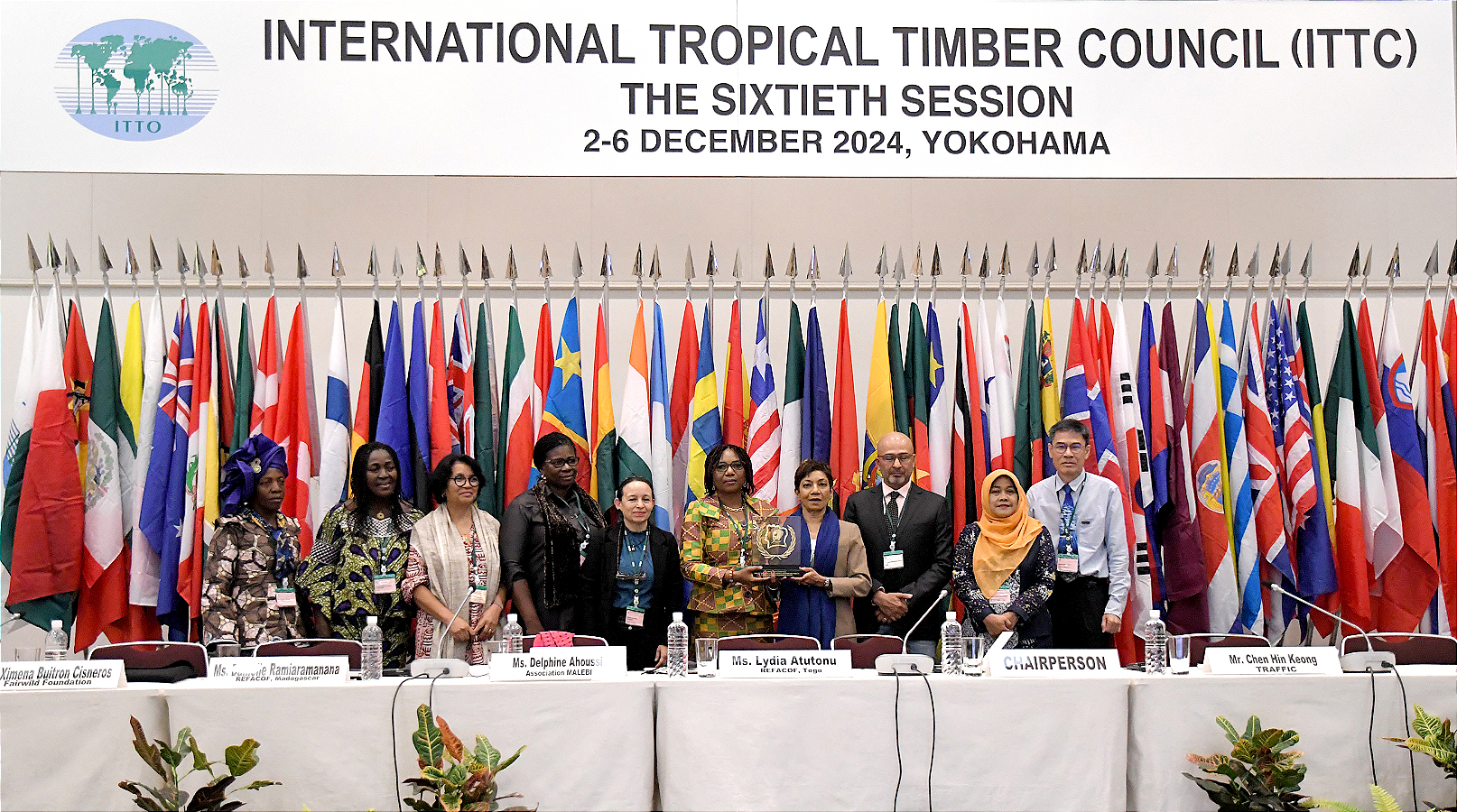
Ms Sheam Satkuru (fourth from the left) receives an award from MALEBI for her commitment to championing women in forestry. Photo: P.Sarigumba/ITTO
ITTO should accelerate support for community-led implementation of its Guidelines for Forest Landscape Restoration in the Tropics to increase the effectiveness of restoration efforts and ensure that communities benefit from them, the Civil Society Advisory Group (CSAG) said in a statement today.
The statement was issued during a CSAG-hosted panel discussion on restoration strategies and experiences held during the 60th session of the International Tropical Timber Council.
“We are very excited that the challenges and opportunities of women-led restoration initiatives have been duly recognized at the highest level of the ITTO,” CSAG said in the statement.
CSAG urged the Council “to further accelerate support for community-led implementation of the ITTO’s published guidelines”, especially those aspects on engaging stakeholders, supporting participatory governance and tailoring work to the local context using diverse approaches. The guidelines, published in 2020, are a technical guide on tropical forest restoration that can be adapted to the needs and capacities of users.
The discussion panel, comprising community-based speakers from the three tropical regions, was convened to highlight the importance of community-led restoration and the policies that need to be put in place to ensure financial inclusion, sustainable use and women’s empowerment.
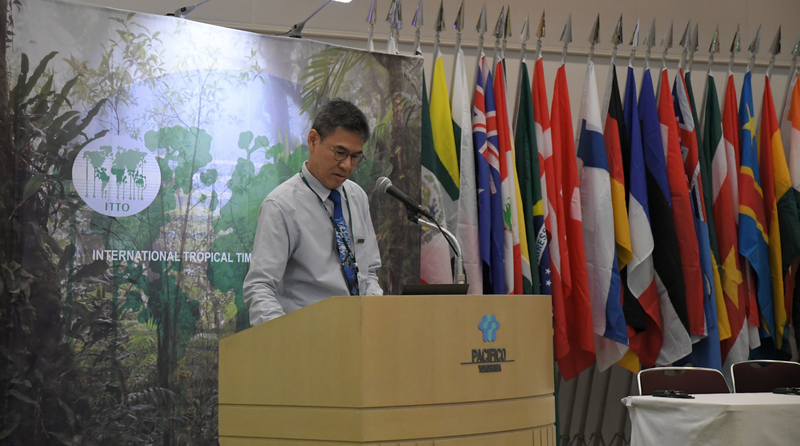
In his presentation, Chen Hin Keong, from TRAFFIC, said sustainable use is controversial in forest restoration because of concerns that it might take the focus away from ecological goals.
“However, we’d see it that nature restoration is about rethinking how to live sustainably and in harmony with nature,” he said. “In general, we cannot pursue a conservation model that separates humans from the natural world.”
Mr Chen said the legal trade of species listed in the Convention on International Trade in Endangered Species of Wild Fauna and Flora was worth USD 220 billion per year. He described several tools that TRAFFIC and partners have developed to support the sustainable, legal, and ethical trade in wild species from landscapes undergoing restoration.
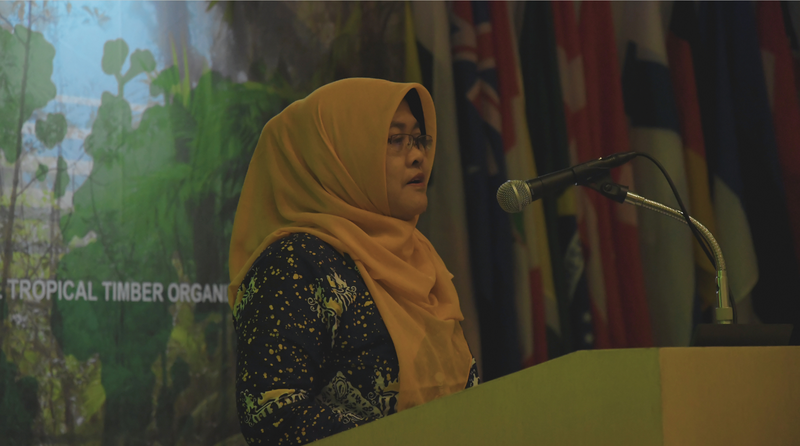
Christine Wulandari, another CSAG representative, spoke about gender roles in forest restoration in Indonesia. She presented findings from case studies in East Nusa Tenggara Province, East Java Province and Lampung Province and concluded that the involvement of women in decision-making on forest management has had positive effects in various areas, included reforestation.
“The paradigm and practice of gender equality in forest restoration is the key to sustainable forest management,” she said.
Delphine Ahoussi, president of the MALEBI association in Cote d’Ivoire, spoke about work by MALEBI and the African Women’s Network for Community Forest Management (REFACOF) to explore the role of carbon finance in supporting rural women to rehabilitate degraded forest landscapes. Danielle Ramiaranmanana, also from REFACOF, presented on efforts in Cameroon, and Amah Atutonu, a third speaker from REFACOF, talked about an ITTO project funded by Soka Gakkai that is supporting women’s groups in their efforts to restore forest landscapes in two prefectures in Togo.
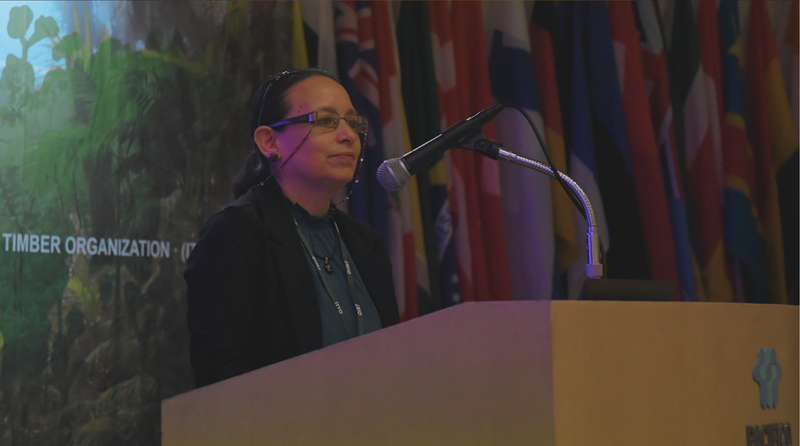
Ximena Buitron Cisneros, from the FairWild Foundation, surveyed restoration strategies in Bolivia, Brazil and Ecuador and the work of her organization to support restoration through certification.
After the presentations, issues raised by delegates from the floor included the importance of land ownership for increasing the role of women in forestry and the role of woodfuel as a sustainable product from restored forests.
Women’s group awards ITTO Executive Director
During the CSAG event, a women’s group in Côte d’Ivoire honoured ITTO Executive Director Sheam Satkuru with an award for her work in supporting women in forestry. The award from the MALEBI Women’s Association was in recognition of Ms Satkuru’s personal role in promoting women’s empowerment in Côte d’Ivoire and elsewhere in West Africa and in appreciation of ITTO’s support. A small ITTO grant to MALEBI in 2009 led to a larger ITTO project in 2016 to restore a 100-hectare area in the Ahua gazetted forest to ensure a continuous supply of wood for charcoal production. This work, in turn, led to a large World Bank project in 2018 with an estimated 345 000 beneficiaries among farmers and forest-dependent communities.
In presenting the award, MALEBI president Delphine Ahoussi said, “The initial grant from ITTO changed the lives of many people, especially women, in our community. We thank ITTO for its support and Ms Satkuru for the way she champions the role of women in forests and livelihoods”.
In accepting the award, Ms Satkuru said, “This award highlights how even very small ITTO grants and projects can catalyse major changes in people’s lives, including by empowering women, restoring degraded lands, instituting sustainable practices and encouraging sustainable businesses”.
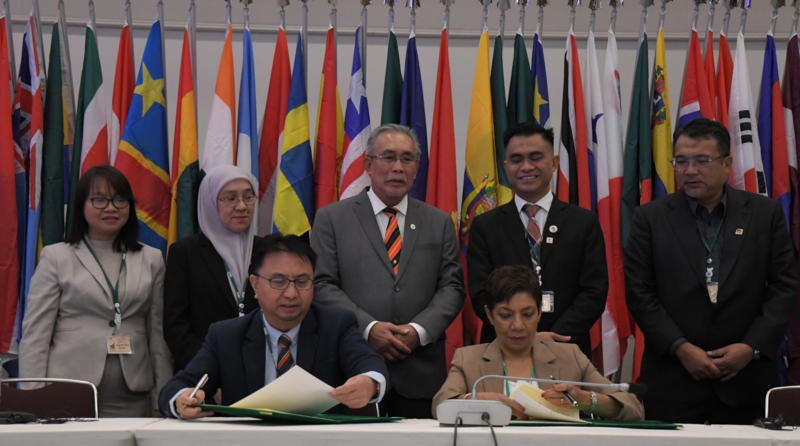
The presentations made during the CSAG panel discussion are available here: https://www.itto.int/ittc-60/presentations.
Daily coverage of the session by IISD reporting services is available at https://enb.iisd.org/ittc60-international-tropical-timber-council.